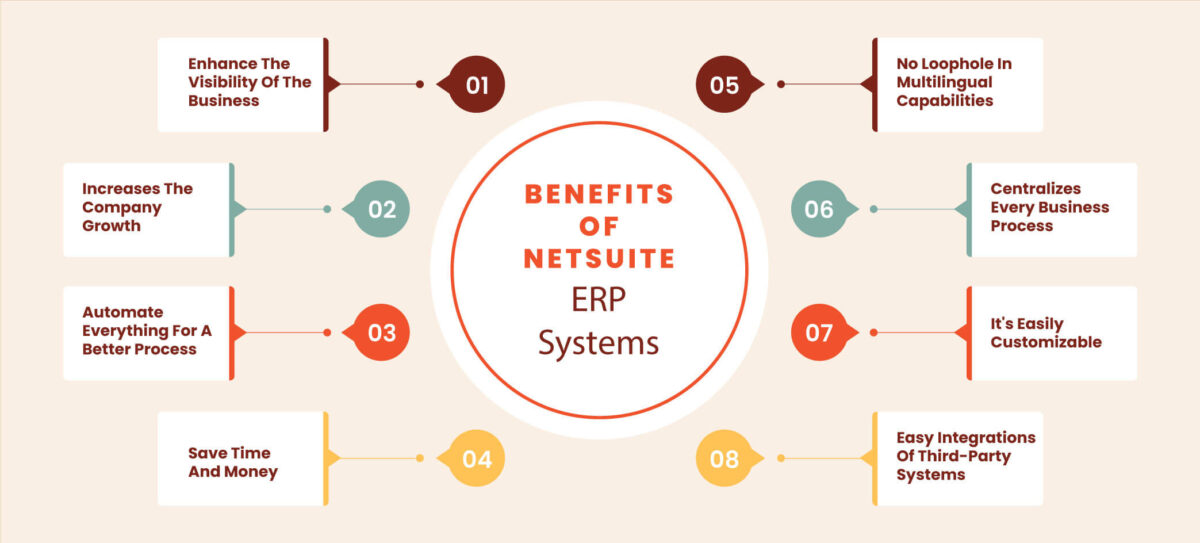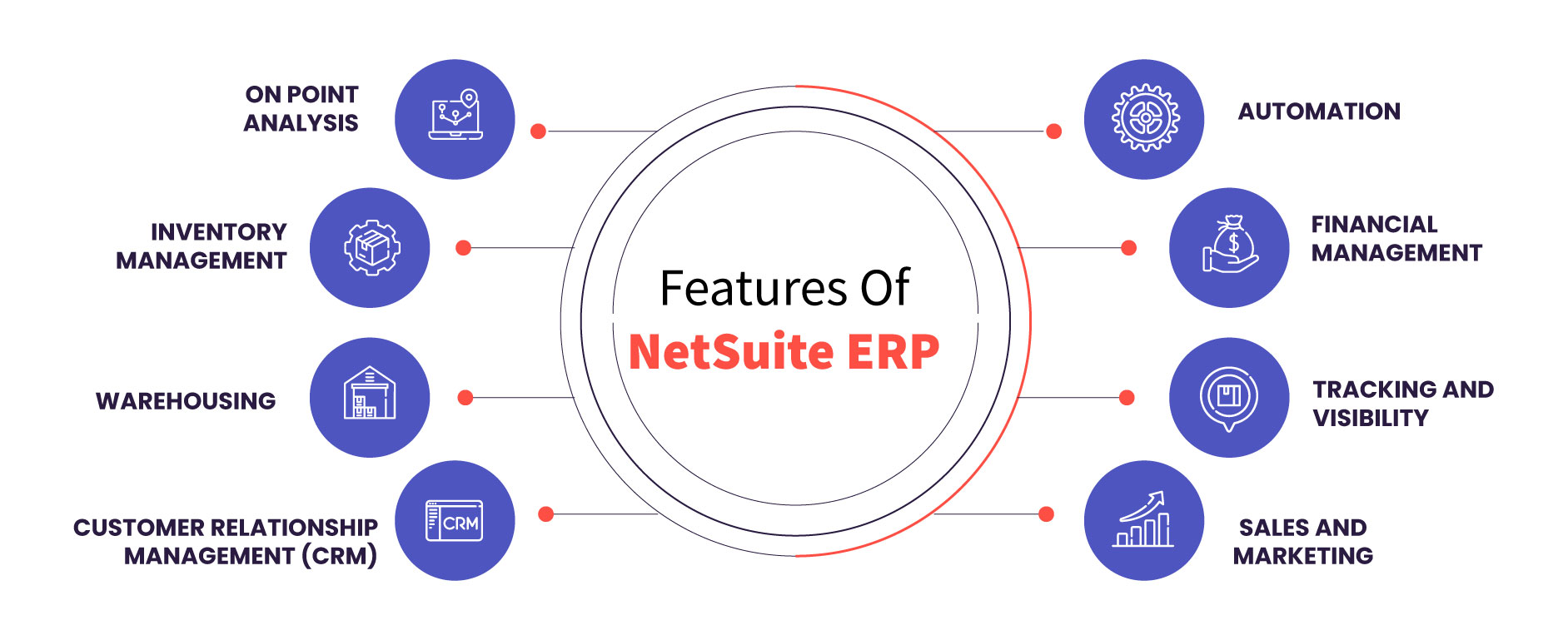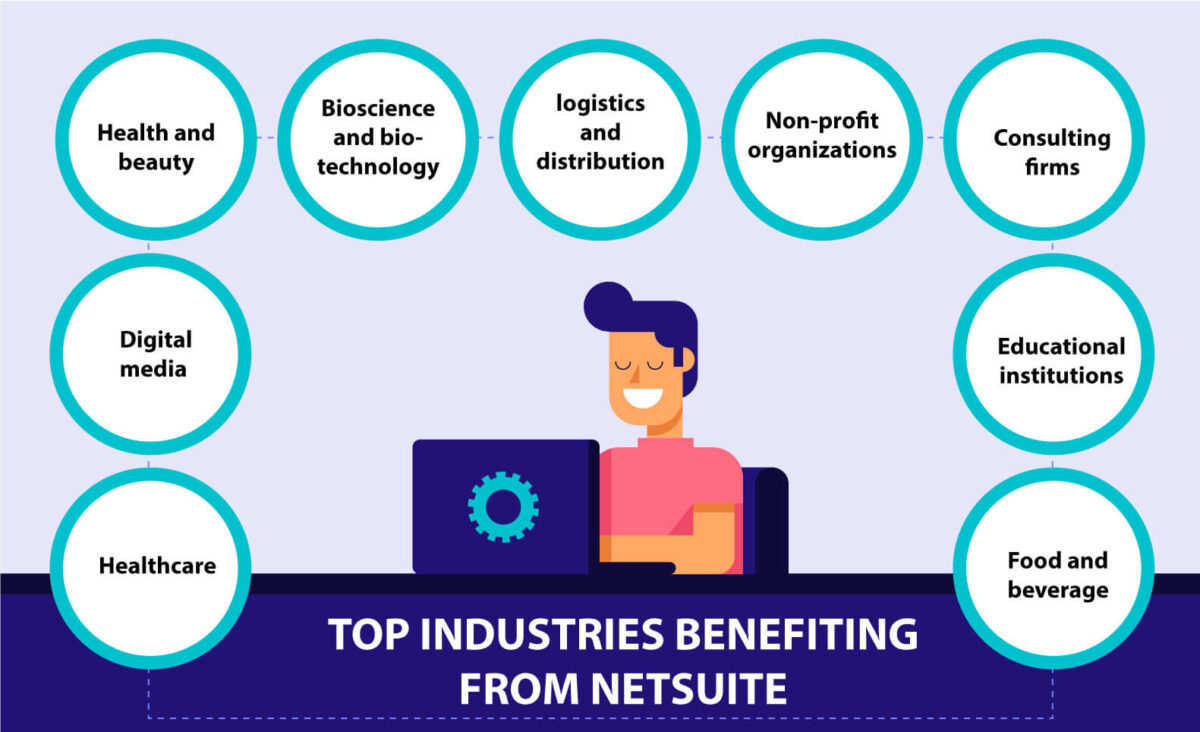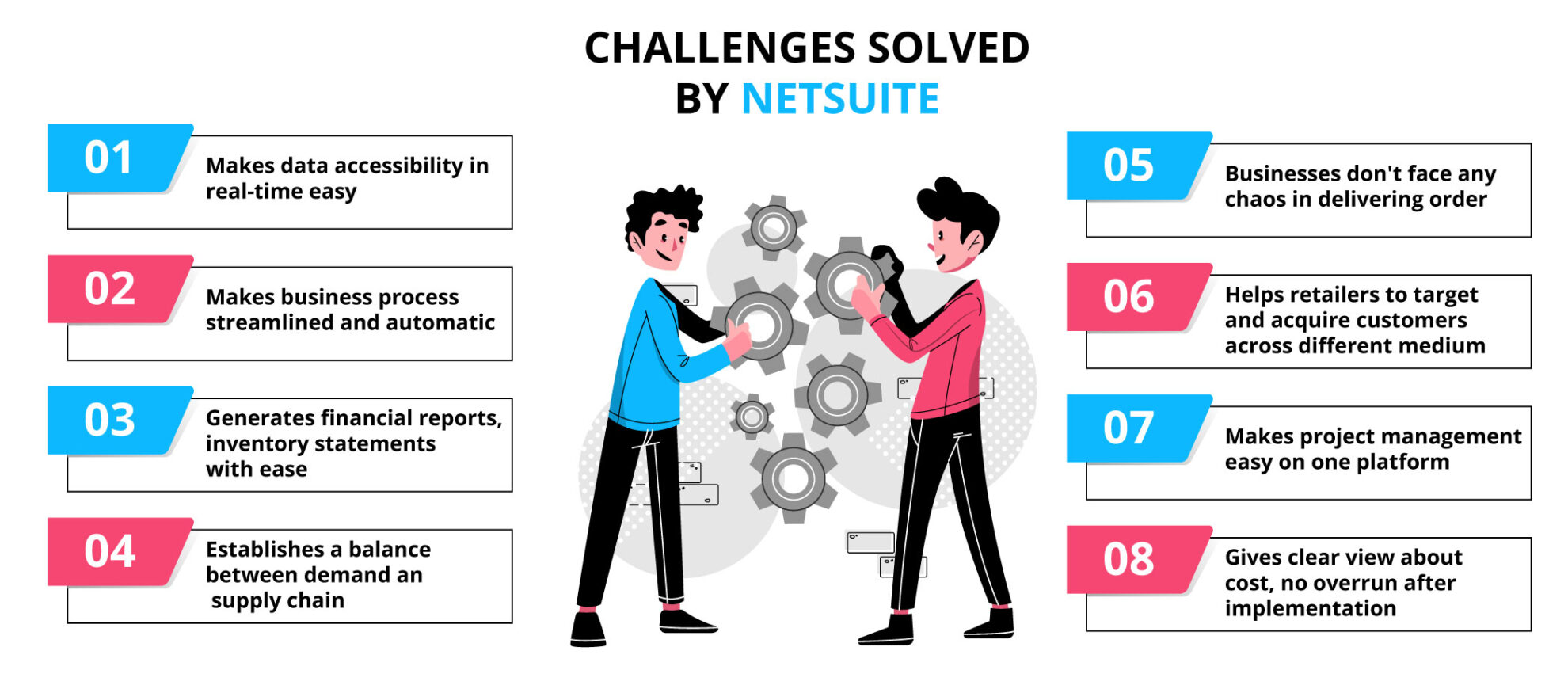NetSuite is the favourite cloud-based ERP platform for top-tier, mid-sized and tech-savvy small enterprises because of its flexibility, extensibility and customization capabilities. It fulfils all the typical ERP requirements that an enterprise with growing business and market footprints needs. With a unified cloud-based platform for managing finance, CRM, supply chain, inventory and other processes, and allows a business to scale and grow seamlessly.
Here in this blog, we will explore NetSuite ERP, its key features, industry-specific advantages, and cost, along with a brief comparison with other ERP suites.
What is NetSuite?
NetSuite is a global leader among the cloud-based enterprise resource planning (ERP) suites, with a presence in more than 220 countries and a growing user base of 38,000 and still counting. NetSuite, as a unified cloud-based ERP and business management platform, comes equipped with modules for financials, CRM, e-commerce, supply chain, inventory, marketing, HR, professional services automation, and a lot of others.
NetSuite modules are designed to cater to different industry domains. These modules and corresponding features can be configured, extended and customized as per specific business requirements and use case scenarios. It also allows seamless integration with legacy systems and other business apps used by the respective organisations.

NetSuite Overview
Only a handful of visionaries and business leaders, way back in the late 1990s, envisioned cloud technology to be the principal value driver for the future of software applications across industries. Oracle co-founder Larry Ellison was certainly one of them. He pursued entrepreneur Evan Goldberg to build a web-based application, leading Goldberg to launch NetLedger, which would become NetSuite in 1998. In 2016, Oracle Corporation will acquire NetSuite, and the platform will be rebranded as Oracle NetSuite.
The Journey from NetLedger to Oracle NetSuite
NetSuite is frequently referred to as the first cloud-based software platform. NetLedger, its predecessor, was launched way back in 1998 with a small office in San Mateo, Calif. NetLedger was a web-hosted accounting software that, in the years to come, will become a unified solution, allowing businesses to replace disparate software systems.
Some of the major investors that helped NetLedger take off its journey include Tako Ventures, StarVest Partners, a software company named ADP and PaineWebber Group. Though it started as accounting software in 2002, with the addition of two more modules, such as CRM and inventory management, it was rebranded as NetSuite.
Over the next one and half decades, under the leadership of newly appointed CEO Zach Nelson, the company experienced rapid growth, starting from $1 million to $1 billion. After Oracle acquired the company in 2016 and started its operation as a Global Business Unit within Oracle Corporation and was rebranded as Oracle NetSuite. Since this acquisition, It has experienced faster growth in terms of expansion, revenue and presence in all ERP market tiers.
Market Position and Popularity
To understand NetSuite’s value propositions and market positioning, it is important to compare it with other leading competitors. For example, SAP was the market leader in the large enterprise segment until very recently, but after 2023, NetSuite emerged as the leading ERP platform in the enterprise category. For 4 consecutive years until 2021, Gartner declared NetSuite as the most sought-after name in the category of “Cloud Core Financial Management Suites for Midsize, Large and Global Enterprises”. This shows NetSuite’s presence is no longer just limited to small and mid-market business segments but also extends to large Fortune 500 companies.
Key Features of NetSuite ERP

NetSuite offers almost all modules and functionalities that enterprises across niches need. From ERP, financial management and accounting to manufacturing, inventory, warehouse, supply chain to CRM, human resource to sales and marketing and offers modules for every functional need.
Let’s have a quick look at the key NetSuite features.
- Accounting Software: It offers fully equipped accounting software to streamline general ledger, accounting and audit reports, accounting processes and tax management. The NetSuite accounting software also allows you to have a detailed view of cash flow and financial performance.
- Financial Management: This feature allows for speeding up regular financial transactions and financial processes while adhering to financial compliance. The feature allows getting a comprehensive view of your organisation’s financial performance.
- Global Business Management: It offers a unified business management platform to help multinational organisations handle operations across different countries and the network of subsidiaries. The feature ensures real-time reporting and data syncing, consolidated financial operation and seamless management of different currencies.
- Enterprise Performance Management: NetSuite optimises enterprise performance and offers a range of tools for planning, budgeting, and forecasting. These tools allow enterprises to optimise their processes to achieve strategic growth objectives.
- Inventory Management: This feature allows managing inventory in real-time ensuring accurate visibility of stocks. The feature also ensures streamlining stock monitoring and order tracking tasks across different business locations.
- Order Management: This NetSuite feature streamlines the processing of an order through the entire cycle of tasks, from order placement to last-mile delivery. The streamlined order management ensures optimum efficiency, accuracy and the least instances of missed business opportunities.
- Supply Chain Management: NetSuite’s supply chain management feature automates the entire supply chain process, ensuring optimum collaboration among vendors and stakeholders. The feature ensures a seamless flow of goods and operational efficiency throughout the supply chain.
- Warehouse Management: The NetSuite warehouse management feature helps streamline warehouse operations. The feature automates warehouse management tasks like inventory tracking, picking, packing, and shipping.
- Procurement: The procurement feature in NetSuite allows enterprises to track the best pricing opportunities for buying goods and services and to ensure purchases at the right time. The feature helps organisations to save time, bring down costs and optimise procurement efficiency through unified management.
Top Industries Benefiting From NetSuite

NetSuite has emerged as the leading cloud ERP platform as it is equipped to address the domain-specific needs of every industry. It is also modular and scalable enough to fit into the requirements of businesses of all sizes.
Some of the most prominent industries that benefited from NetSuite include the following:
- Advertising and Digital Marketing
- Retail & e-commerce
- Manufacturing
- Financial services
- Food and beverage
- Healthcare
- Consulting services
- IT Services & Software
- Professional Services
- Transportation and Logistics
- Wholesale Distribution
- Education
- Energy
- Media and publishing
- Nonprofit
- Hospitality
Business Challenges Solved by NetSuite

NetSuite is capable of mitigating almost every challenge modern enterprises face for pushing growth, boosting productivity and efficiency and streamlining processes. Let’s have a quick look at the most common business challenges addressed by NetSuite.
Real-Time Access to Data
NetSuite ensures real-time data access throughout the organisation allowing faster and well-informed decision making. Real-time data accessibility through NetSuite’s unified platform ensures quick response time and agility.
Business Process Automation
NetSuite, through well-articulated workflows and task management protocols, streamlines routine tasks and makes managing business processes easier irrespective of their complexities; task automation and proactive adjustments in workflows optimise resource utilisation, resulting in higher productivity and enhancing the bottom line.
Precise Reporting
Many businesses face the challenges of less precise or delayed reporting, resulting in flawed or siloed decision-making processes. NetSuite, by providing precise and accurate reports and statements for critical processes such as finance, inventory, warehousing, sales or customer engagement, ensures that the company has a solid grasp of what’s going on within the processes.
Inventory Control
Under-utilised stocks, slow movement of inventory or lack of stock monitoring results in the loss of millions for many businesses dealing with physical goods. NetSuite, through its robust inventory management systems, helps maintain the right balance between demand and supply. This ultimately prevents situations like stockouts or excess stock levels, resulting in optimum resource utilization and improved cash flow.
Order Fulfilment & Delivery
Retailers and suppliers often face the challenges of slow or erroneous order processing and delivery, resulting in a loss of revenue or reputation. NetSuite, through proactive monitoring of orders right from the inception to the last-mile delivery stage, ensures optimum accuracy, reliable fulfilment process and reliable delivery.
Customer relations
Many businesses competitively remain on the back foot due to poor customer relations. NetSuite offers an integrated CRM module with all modern features for efficient and proactive interactions. It can bring a visible difference to business output through enhanced customer retention, and improved customer experience.
Scalability
Enterprises relying on disparate software systems for different functions often have a slow response time to adjust to the new requirements as their businesses expand and grow. NetSuite is designed to scale through changes in system configuration or through required customisations.
Financial management
Many businesses depend on different financial and accounting tools and lack unified financial planning. NetSuite, through a unified module for financial management, provides end-to-end capabilities for planning, forecasting and budgeting.
Integrating legacy systems
In any enterprise environment, there are a plethora of software applications used for different functions. Integrating these disparate legacy systems into a unified ERP platform often becomes a challenge. NetSuite ensures a seamless integration experience resulting in zero disruption or process silos.
Data Security and compliance issues
Maintaining data security and adhering to industry-specific compliance requirements remains a challenge for businesses across the niches. NetSuite comes equipped with robust data security protocols, and it is designed to check industry-specific compliance requirements from within. For example, a healthcare company, by leveraging NetSuite, can remain full-proof to compliance requirements specific to the healthcare industry.
How Much Does NetSuite ERP Cost?
To understand how much NetSuite pricings, it is important to have a solid grasp of the principal cost components. The annual license fee that you need to pay consists of 3 main components such as the core NetSuite platform, the modules you need and the total number of users. So, depending on the choice of modules and the number of users, the cost may vary.
The core NetSuite platform offers the four principal modules out of the box and they include accounting, inventory management, order management and tax management. Any additional module chosen in addition to these core capabilities will add to the price. The good thing is, at any given point in time, they pay for exactly what they need.
The cost component based on the number of users naturally differs from small to mid-sized to large organisations. Apart from this annual licensing cost, there is also the cost of implementation. The NetSuite implementation company, based on the scope and complexity of the project, quotes an implementation fee.
For an exact quote for the implementation cost and expert guidance on the required modules and corresponding costs, click here for a free consultation.
How does VNMT Assist you in Implementing NetSuite?
VNMT, as a NetSuite Solution Provider, is known for its customer-centric approach and strong track record of implementing and customising for enterprises across all niches and sizes. With a robust team of certified NetSuite experts, we can help enterprises make the most of the advantages irrespective of the business challenges.
Our NetSuite implementation team manages the entire implementation and business alignment process, including integration with legacy software systems to perform system testing and proactive NetSuite optimization. Our implementation and customisation specialists also ensure optimum scalability and extensibility as your business grows.

Conclusion
NetSuite ERP, with its robust cloud-native platform, helps streamline business operations for optimum efficiency, productivity and growth. Compared to other leading cloud ERP platforms, NetSuite is more modular in nature, allowing incremental scaling and extension with the business growth. This is why NetSuite is more suitable for small to medium-sized enterprises requiring a unified cloud platform for business process management.
















